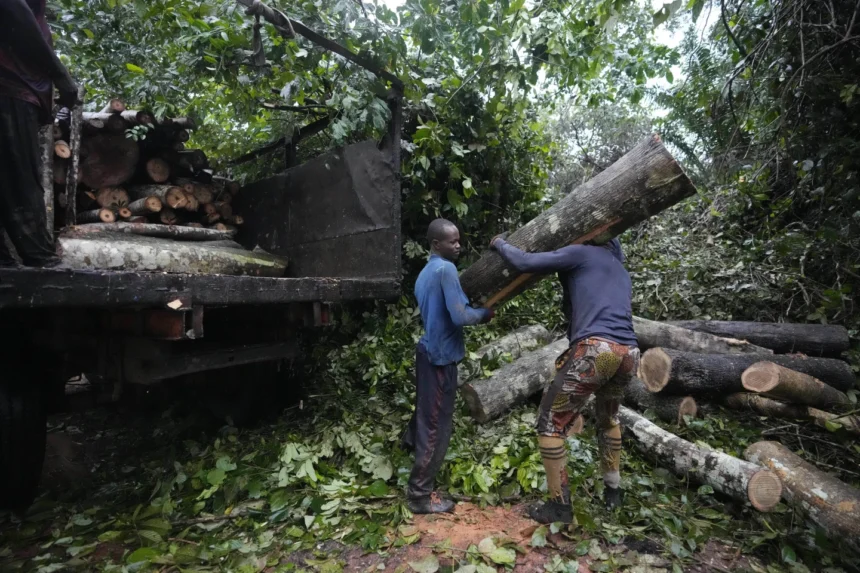Africa’s local communities endowed with mining resources and rich biodiversity are increasingly emerging as the hotbed of violence, according to the latest Global Witness Report which uncovered the death and disappearance of 146 land and environmental defenders globally in 2024 alone.
The Global Witness hinted that attacks and intimidation are becoming a mainstay in front-line communities helping to preserve nature’s biodiversity in Africa due to the maximizing of short benefits by perpetrators including corporations seeking to shut down dissent.
Senior Advisor at Global Witness, Laura Furones told Pan-Atlantic Kompass at the virtual launch of the report: ‘Roots of Resistance’, that it documented the killing of nine land and environmental defenders across Africa in 2024. The investigative body says it tracks how ‘industries fuelling the climate crisis profit from destruction’, exposing the ‘corporate abuses of power that harm people and planet.’
Breaking down the numbers, Furones said four cases of killings were recorded in the Democratic Republic of the Congo (DRC), three in Liberia, one in Cameroon, and one in Madagascar.
DRC Gets A Verdict
The Global Witness report published on Wednesday, September 17, 2025 revealed that “all four of those killed in DRC last year were working to protect Upemba National Park from exploitation. Two were park rangers working to prevent poaching and mining. Two other defenders, who were helping to track the movements of elephants within the park, were kidnapped and found dead days later.”
According to the report, with “78 cases between 2012 and 2024, DRC ranks as the deadliest country” for environmental defenders in Africa, and “eighth in the world.”
This digital magazine reports that DRC has been trapped in decades-old intractable wars for many reasons. The central African country has the largest concentration of natural resources in Africa with concerns that this has continued to elicit morbid global interests, fuelling conflicts and unending clampdowns on the human rights of locals there.
“The new figures bring the total number of defenders killed or disappeared in Africa since 2012 to at least 126 – with DRC accounting for almost two-thirds of these cases. Other cases have been documented in Kenya (6), Liberia (6), South Africa (6), Chad (5), Uganda (5) over the last 12 years, among several others.”
Speaking further on the report’s findings, Furones cautioned that these cases might have been underreported, highlighting issues around data collection on lethal attacks across the continent.
In her words: “These already chilling figures are most likely a gross underestimate. The continued difficulty in building an evidence base on the situation faced by defenders in Africa has led to the under-reporting of attacks and the under-representation of defenders in this region.
“Just because we are not recording as many cases in Africa, that does not mean it’s not dangerous for defenders. In fact, the opposite is true, with the severe repression of civic space leaving many defenders too scared to speak out in the first place.”
While the documented 146 cases worldwide in 2024 was down from 196 in 2023, Furones noted that the figure implies that on an average, around three defenders are killed or disappeared each week.
Nigeria’s Ekuri Community Fights to Save Its Rich Biodiversity
Nigeria was not spared in the findings as the report highlighted the current plight of the Ekuri community on the border of the Cross River National Park in the country’s South-south region. The community which had in the past won the United Nations prize for its front-line battle to save its ancestral forest rich in both plant and animal biodiversity is now under the threat of illegal logging and expansion of corporate interests.
This has led to community activists being subjected to escalating threats, violence and criminalisation as they fight to protect their land and livelihoods, according to Martins Egot, Chairman of Ekuri Initiative and Executive Director of Panacea for Developmental and Infrastructural Challenges for Africa (PADIC-Africa).
Reacting to the findings of the Global Witness report, Egot said “Like so many communities across the country, continent and the world, Ekuri has seen the devastating effects of rampant resource exploitation and corruption – and devastation of our land and environment – all in the name of profit.
“We know how powerful community-led conservation can be in protecting forests, and the planet – we have seen it for ourselves. The international community must recognise the role we play. When communities like ours are empowered, they become the most effective guardians of the environment.”
A Victim’s Reaction to Global Witness Report
Similarly, Odey Oyama, a victim of attack from corporate interests highlighted the different ways in which environmental defenders are being attacked and silenced beyond killings and disappearances – such as criminalization. Oyama told journalists that in January this year, he was arrested by a team of over 40 police officers wearing masks and armed with guns. Along with four others, he was charged with promoting inter-communal war, which carries a penalty of life imprisonment.
“My arrest was a clear attempt to silence me for standing up to corporate logging interests and official corruption. It’s a tactic used to intimidate those who oppose the destruction of our forests.” Oyama, who is the Executive Director of Rainforest Resource Development Center (RRDC) added: “Defending our environment is a perilous job. You can easily be killed. I have just been lucky. It is vital that international bodies support forest defenders like me and hold accountable those who facilitate illegal logging.”
Executive Director of Renevlyn DeveIopment Iniatitive (RDI), Philip Jakpor, said the criminalisation of defenders is an issue across Africa, hailing the report for breaking “the norm of global reports with far-reaching impacts that exclude Africa.
“The Global Witness 2025 report challenges environment and land rights defenders across Africa to own their destinies by speaking up so that the many injustices perpetrated by state-backed corporate entities can be exposed and challenged.” Jakpor said while hosting the Nigeria’s launch of the report on Tuesday. He called for more work to expose perpetrators of attacks against land and environmental defenders on the continent.





